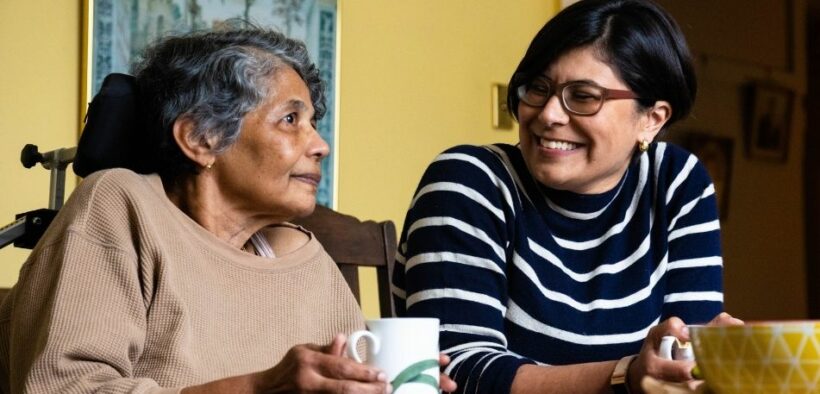Opinion: Supporting our carers – “You can’t pour from an empty cup!”
Share

Do you look after a family member or friend with a disability, mental health condition, chronic condition, terminal illness, an alcohol or other drug issue or who is frail aged?
Do your caring responsibilities affect your wellbeing or your ability to work, study or socialise?
You are one of Australia’s 2.65 million carers!
This year has had held many challenges for all of us. But lockdowns, the closing of regular support services, and isolation is particularly hard for those who provide unpaid care for others. Many of the people they care for also happen to be especially vulnerable to COVID-19, adding to the stress of an extraordinary year.
This year, National Carers Week will be held from 10-16 October 2021. Carers are people who provide unpaid care and support to family members and friends. Anyone at any time can become a carer and some people don’t even realise they are a carer.
The Carer Gateway is funded by the Australian Government nationally and provides in-person, phone and online services to Australia’s army of unpaid carers. This week we celebrate and tell the stories of two of our amazing carers – Tania Teague who cares for her mother Anita and Laura Chu who cares for her son Eddie.
Meet Tania Teague
Tania cares for her mother, Anita, who has a degenerative condition, spinocerebellar ataxia type II. The condition progressively affects her mum’s motor skills and she is no longer able to live independently.

Tania Teague
“My father was a carer for mum. At the end of 2015, I returned to Australia and I saw that dad needed help too. Like many, I initially did not know I was a carer until someone pointed it out. Fortunately, the first iteration of the Carer Gateway had been launched online a few months earlier, so I was able to use the resources to learn about being a carer and find what support was available,” says Tania.
Tania’s carer role oscillated from sharing care responsibilities with her father to full time when her dad ended up in hospital and then recently passed away.
“Through the Carer Gateway I have used respite care a few times and that has been really beneficial. When I was caring for dad and planning his funeral mum still needed full-time care so I needed this support. I have also used the self-guided coaching which I found a really good way to just reset and re-balance my expectations and mental health in my own time. If I hadn’t come across Carer Gateway, the navigation of the carer system would have been quite difficult,” says Tania.
One upside of the COVID-19 pandemic has meant that flexible work has now thankfully become a mainstream conversation. This gives carers hope that they can continue their careers with work that can be done around the changeable demands of care.
“I’ve learnt to look after myself by taking even small moments to step away and self-care. I find I often return to the analogy, ‘you can’t pour from an empty cup’. Carer Gateway has made me a better carer, it’s helped me to take that time I need, for me so I can be there for mum. I have encouraged many people just to register, even if they don’t need the services at that time, they might need it in the future. I’ve found that the more I talk about being a carer the more people open up about their own caring role. It’s a great way to share the knowledge of and the support offered by the Carer Gateway.”
Meet Laura Chu
Laura cares for her 27 year old son Eddie who has down syndrome, autism, several behavioural issues, severe atrioventricular septal defect (AVSD) and cognitive impairment. Eddie needs visual and gestural support for all living tasks.

Laura Chu
“It’s a 24/7 task for me. Caring for my son to ensure his health, happiness and peace takes up all my time. I just want to keep supporting him. It is very busy day. I can’t leave ‘the carer work’ at any time – except when he is asleep. If he is sick or in a bad mood hungry then I have to work ‘overtime’.”
For Laura, daily tasks caring for her son include personal care such as brushing teeth, washing his face, helping him get dressed and taking him to the toilet. In addition to that she does the washing, cleaning and meal preparation. Laura also has to watch Eddie when he eats to ensure he doesn’t choke. Eddie spends some of his time at a Day Centre so that is the only time Laura gets a break.
“Through the Carer Gateway I have been receiving useful and important information such as how to get respite services and how to manage Eddie’s NDIS plan. I also received transportation subsidies to support myself and attended some mental and well-being support sessions. These services are very important to me. I feel supported when there people who are caring and professional on my side.”
The Carer Gateway provides services for carers including counselling, respite care (emergency and planned), coaching, connecting you with other carers through peer support, online skills courses and financial support. There are additional services for young carers including tutoring to help with schoolwork and exam preparation, access to educational programs and driving lessons.
Deloitte Access Economics calculated that in 2020, carers like Tania and Laura would deliver unpaid care that would cost the government $77.9 billion if we had to pay for it. Those carers between them have given up an estimated $15.2 million in wages to deliver this care. In Carer’s Week we stop and acknowledge the extent of this contribution. Carers are on the frontline keeping the people they care for safe on a daily basis during this pandemic, and without them our already stretched system would fall apart.
As a carer (of any age) you can call the Carer Gateway team from anywhere in Australia on 1800 422 737 between 8am – 5pm Monday – Friday or visit www.carergateway.gov.au
Your Side is one of a national network of organisations who deliver Carer Gateway.
Danielle is the CEO of Your Side Australia. our Side Australia (also known as Your Side) is a leading provider of support services for older people, people living with disability, mental health, and their carers throughout Sydney.





















